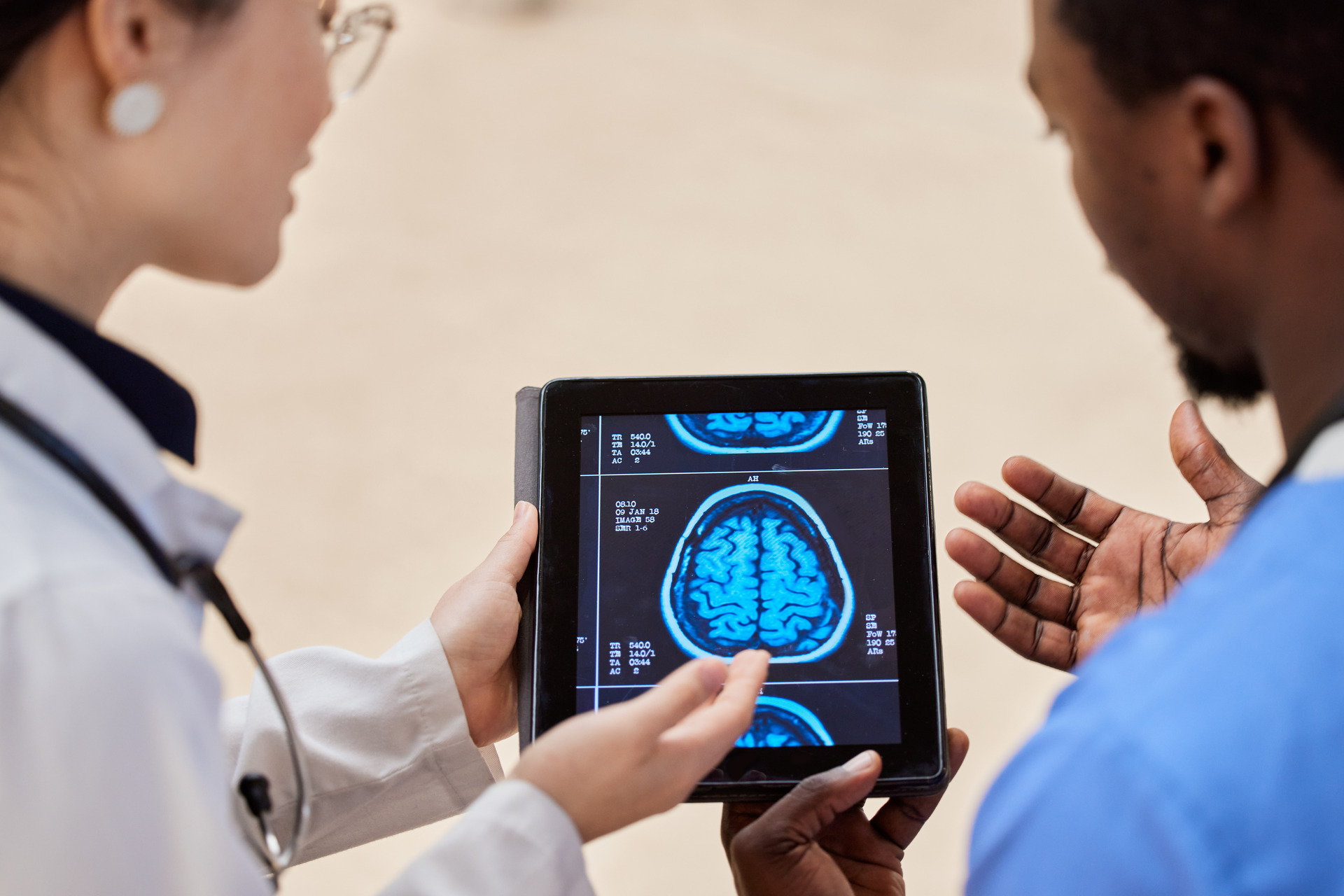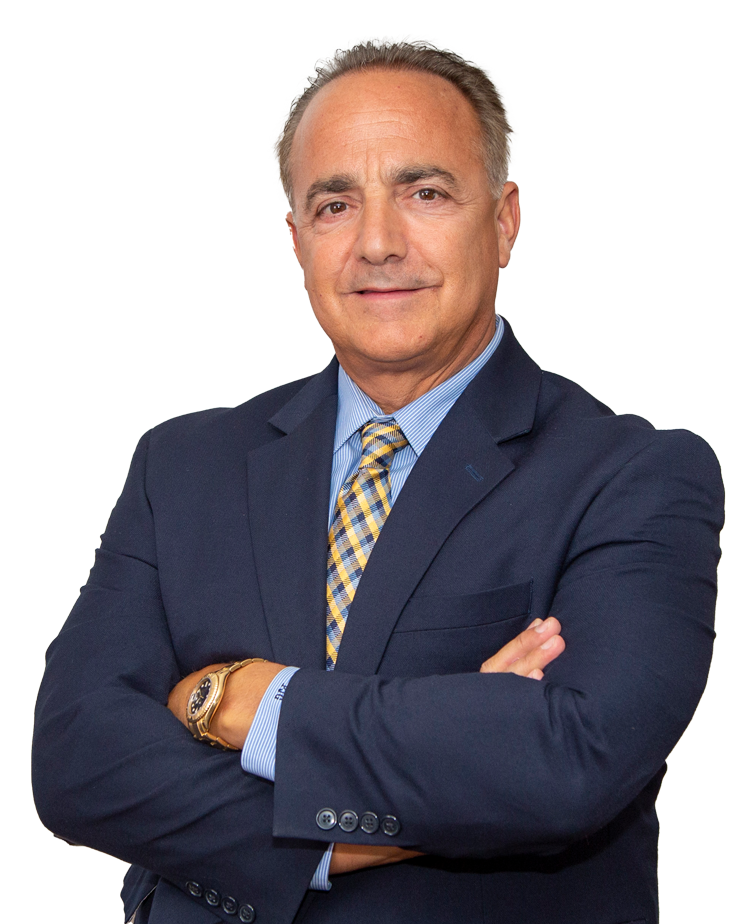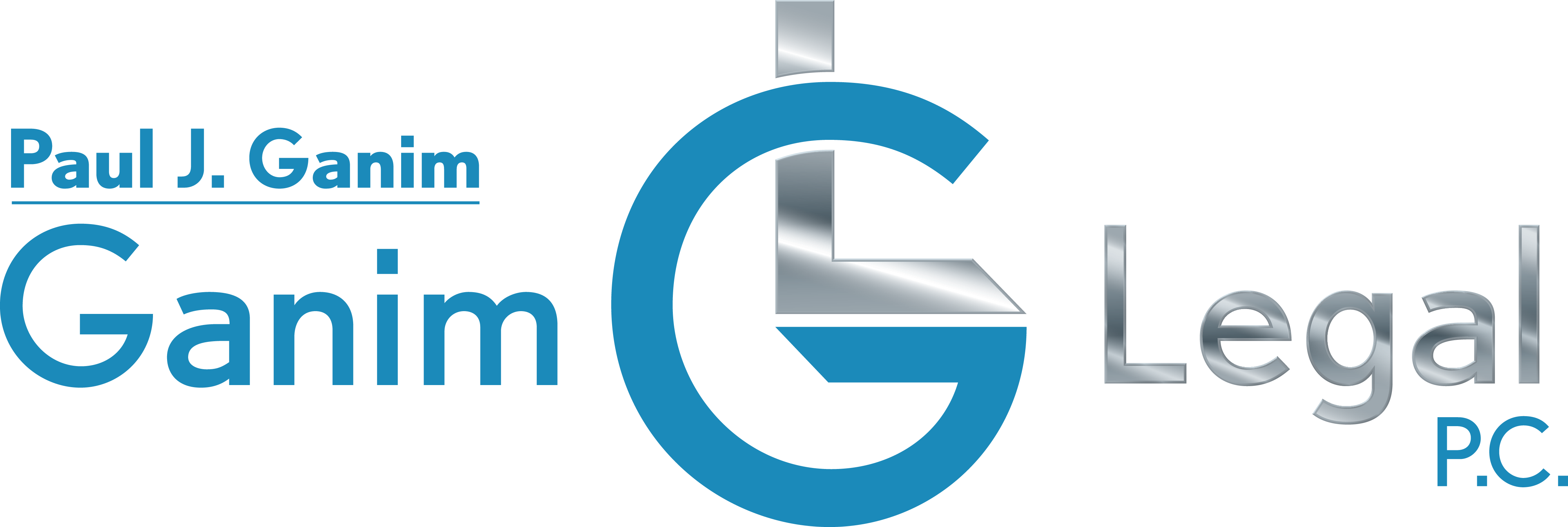A traumatic brain injury can transform your life in an instant. One moment you’re driving on I-95 through Bridgeport or walking downtown, and the next you’re facing cognitive difficulties, personality changes, physical limitations, and mounting medical bills that can quickly reach hundreds of thousands of dollars.
For many TBI survivors in Bridgeport, the injury is just the beginning of a long, difficult journey.
⚠️The complex nature of brain injuries creates unique challenges in personal injury cases. Many TBIs don’t appear on standard imaging, symptoms can evolve over time, and insurance companies frequently dismiss these “invisible injuries” despite their profound impact.
Victims and their families often find themselves fighting not just for recovery, but for validation and fair compensation.
✔️At Ganim Legal, P.C., our Bridgeport brain injury lawyers understand the devastating effects of traumatic brain injuries and have secured substantial compensation for victims, including a $365,000 award for a woman injured by an unsecured metal gate in Bridgeport.
Ready to take the next step? Contact us or call 475-471-0318 today for a free consultation about your brain injury claim.
Do You Have a Case?
To pursue a brain injury claim, our Bridgeport personal injury lawyers must show that your situation meets the legal requirements for a personal injury case. Here’s what that involves:
- Duty of care: Someone had a legal responsibility to ensure your safety, whether a driver, property owner, employer, or product manufacturer.
- Breach of duty: That party failed in their responsibility through negligence, recklessness, or intentional misconduct. This might involve a driver texting behind the wheel, a store failing to address hazards, or a company manufacturing defective products.
- Causation: This breach directly led to the accident where you suffered a traumatic brain injury. We establish a clear connection between the negligent actions and your specific neurological damage.
- Damages: You suffered verifiable losses, which can take the form of cognitive impairment, emotional changes, physical disabilities, medical expenses, lost income, and diminished quality of life.
Damages You Can Recover
If you hire our brain injury lawyer in Bridgeport, we would look to pursue the following on your behalf:
- Economic damages: These cover quantifiable financial losses, including emergency care, hospitalization, surgery, rehabilitation, cognitive therapy, specialized equipment, home modifications, lost wages, reduced earning capacity, and lifetime care costs.
- Non-economic damages: These compensate for intangible suffering such as physical pain, emotional distress, cognitive difficulties, permanent disabilities, personality changes, and loss of enjoyment of life.
- Punitive damages: In cases involving gross negligence or intentional misconduct, Connecticut courts may award additional compensation meant to punish the wrongdoer and deter similar behavior.
⚖️Under Connecticut General Statutes § 52-572h, injury victims may recover both economic and non-economic damages, with no cap on the amount that can be awarded for proven losses.
💡 Hypothetical Scenario: A pedestrian suffered a moderate traumatic brain injury when struck by a distracted driver in downtown Bridgeport. The settlement included $275,000 for medical treatment and cognitive rehabilitation, $225,000 for lost earning capacity due to persistent concentration and memory issues, and $300,000 for pain, suffering, and diminished quality of life, totaling $800,000 in compensation.
Settlement Examples
Settlement amounts for brain injury cases can vary widely, depending on factors like the severity of the injury, long-term care needs, lost earning potential, and the strength of the evidence. Typical ranges could be:
| Brain Injury Severity | Common Symptoms | Typical Treatment Costs | Potential Settlement Range |
|---|---|---|---|
| Mild TBI/Concussion | Headaches, confusion, temporary memory issues | $15,000 – $50,000 | $50,000 – $250,000 |
| Moderate TBI | Extended unconsciousness, behavioral changes, cognitive deficits | $100,000 – $500,000 | $250,000 – $1,500,000 |
| Severe TBI | Extended coma, profound neurological damage, permanent disability | $1,000,000 – $3,000,000+ | $1,500,000 – $10,000,000+ |
| Catastrophic TBI | Vegetative state, minimal consciousness, lifetime care needs | $5,000,000 – $15,000,000+ | $5,000,000 – $20,000,000+ |
Want to know what your traumatic brain injury in Bridgeport claim may be worth? Contact us to discuss the full range of damages you may be entitled to recover.
Who Can You Hold Liable?
Liability for a brain injury isn’t always straightforward—but our TBI attorneys fight to hold all responsible parties accountable, no matter how complex the circumstances may be
- Vehicle operators: Drivers who cause accidents through negligence, from distracted driving to impaired operation or aggressive behavior.
- Property owners: Businesses, residences, and government entities that fail to maintain safe premises, leading to slip and falls or other incidents causing head trauma.
- Employers: Companies that neglect workplace safety regulations, resulting in falls, falling objects, or other incidents causing brain injuries.
- Product manufacturers: Entities that design, manufacture, or sell defective products that malfunction and cause head injuries.
- Medical providers: Healthcare professionals whose negligence leads to brain damage through surgical errors, medication mistakes, or failure to properly diagnose and treat.
- Government entities: Public agencies responsible for hazardous road conditions or other dangers (subject to special filing requirements and immunity limitations).
How to Get in Touch With Our Bridgeport Traumatic Brain Injury Lawyers
- Phone: 475-471-0318
- Contact Us Page
Take advantage of our Bridgeport personal injury attorney free consultation to understand your legal options with no obligation or upfront cost.

How Our Bridgeport Traumatic Brain Injury Law Firm Can Help
We know how deeply a traumatic brain injury can affect every part of your life—and your family’s. Here’s how our Bridgeport traumatic brain injury law firm works to support you at every step and fight for the full compensation you deserve:
- Specialized medical knowledge: We understand the unique challenges of documenting and proving brain injuries, including those that don’t appear on standard imaging.
- Expert connections: We work with neurologists, neuropsychologists, neuroradiologists, and life care planners who can document your injury and its long-term impact.
- Comprehensive damage assessment: We calculate not just current medical expenses but the lifetime costs of living with a TBI, including future care needs and diminished earning capacity.
- Evidence preservation: We act quickly to secure critical evidence before it disappears, including surveillance footage, witness statements, and accident scene documentation.
- Compelling case presentation: We translate complex medical information into clear, persuasive arguments that judges and juries can understand.
- Maximum value pursuit: We fight insurance company tactics designed to minimize or dismiss brain injury claims, ensuring no aspect of your suffering goes uncompensated.
- Family support: We provide resources and guidance for families through the challenges of supporting a loved one with a TBI, connecting you with support services and community resources.
Important Initial Advice!
If you’ve suffered a brain injury, taking the right steps early on can protect both your health and your legal rights—and we can support you with each of them:
- Contact our Bridgeport brain injury attorneys first: Brain injury claims require specialized legal knowledge and should be handled by attorneys with experience in this complex field. Early guidance can make a major difference.
- Seek specialized medical care: Even if initially cleared at the emergency room, follow up with a neurologist or TBI specialist. Many brain injuries are missed in initial screenings or worsen over time.
- Document everything: Keep detailed records of all symptoms, no matter how minor they seem. Brain injury symptoms can fluctuate and evolve, and this documentation will be important evidence.
- Follow all treatment plans: Attend every appointment and complete recommended therapies. This demonstrates the severity of your injury and your commitment to recovery.
- Maintain a symptom journal: Record daily cognitive, emotional, and physical symptoms, including how they affect your work, relationships, and daily activities.
- Limit social media use: Insurance investigators monitor social media for posts that could contradict your injury claims. A single photo or comment taken out of context can damage your case.
⚠️ Insurance companies frequently downplay or deny TBI claims, especially those involving “mild” traumatic brain injuries that don’t show on standard CT scans or MRIs. They may argue your symptoms are psychological or pre-existing, despite the significant impact on your life.
Don’t Delay in Starting Your Claim
Connecticut has a two-year statute of limitations for personal injury claims, including those involving traumatic brain injuries. This means you must file your lawsuit within two years of the date of the injury.
⚠️ While this may seem like ample time, building a strong brain injury case requires extensive preparation, including collecting medical evidence, consulting with specialists, and documenting how the injury has affected your life over time. These cases are particularly complex because some symptoms may not fully manifest immediately after the incident.
Claims against government entities have even shorter notice requirements—sometimes as little as 90 days. Missing these deadlines means permanently losing your right to seek compensation, regardless of how severe your brain injury might be.
Contacting us promptly ensures all filing deadlines are met and your rights are protected.
Evidence to Gather For Your Brain Injury Claim
We understand that gathering this evidence can be overwhelming when dealing with brain injury symptoms. Our team can handle this complex process for you, ensuring no key information is missed.
- Medical records: Complete documentation from emergency services, hospital stays, follow-up care, and all specialized testing such as MRIs, CT scans, and neuropsychological evaluations.
- Expert opinions: Written assessments from neurologists, neuropsychologists, and other specialists detailing your diagnosis, prognosis, and how the injury has impacted your cognitive, emotional, and physical functioning.
- Before and after evidence: Documentation showing changes in your work performance, daily activities, and relationships compared to your pre-injury functioning.
- Witness statements: Accounts from family members, friends, and colleagues who can testify to observed changes in your behavior, abilities, and personality.
- Accident documentation: Police reports, photographs, surveillance footage, and other evidence establishing how the injury occurred and who was responsible.

How Much Are the Fees?
At Ganim Legal, P.C., we handle traumatic brain injury cases on a contingency fee basis, which means:
- You pay nothing upfront or out-of-pocket for our legal services
- We only collect a fee if we win your case through settlement or verdict
- Our fee is a percentage of your recovery, agreed upon before we begin
📌Brain injury cases often require significant investment in expert witnesses, specialized testing, and detailed life care planning. We advance these costs on your behalf, recovering them only if we secure compensation for you. This arrangement ensures you can pursue justice regardless of your current financial situation.
Our Legal Process For Your Brain Injury Claim
We understand how overwhelming a brain injury case can be—but you don’t have to go through it alone. Here’s how we handle the legal process, step by step, to build the strongest possible claim on your behalf:
- Comprehensive case evaluation: We analyze the circumstances of your injury, assess liability, and begin documenting the full extent of your damages.
- Medical examination and documentation: We arrange for specialized evaluations with appropriate medical experts to fully document your brain injury and its effects.
- Evidence gathering: We collect accident reports, witness statements, surveillance footage, and other critical evidence establishing how your injury occurred.
- Life care planning: For moderate to severe TBIs, we work with experts to develop a comprehensive life care plan detailing all future medical and support needs.
- Economic impact analysis: We consult with vocational experts and economists to calculate lost earning capacity and the lifetime financial impact of your injury.
- Liability determination: We identify all potentially responsible parties and develop the legal theories to hold them accountable.
- Strategic demand preparation: We present a comprehensive demand to the insurance company that fully accounts for all your past and future damages.
- Skilled negotiation: We leverage our evidence and expertise to counter insurance company tactics aimed at minimizing your recovery.
- Litigation when necessary: If a fair settlement isn’t possible, we prepare your case for court, handling all filings, discovery, and trial preparation with a specialized focus on effectively presenting complex brain injury evidence.
Why Choose Us Over Other Bridgeport Brain Injury Attorneys?
At Ganim Legal, P.C., we deliver the rare combination of personal attention and powerful legal strategy. Unlike larger firms where you might feel like just another file, Attorney Paul Ganim personally oversees every brain injury case—bringing over 30 years of experience in Connecticut courts to your side.
✔️Our injury lawyers in Bridgeport know how to make the invisible visible. Brain injuries are often misunderstood or minimized, but our team knows how to explain complex neurological damage in ways that insurance companies, judges, and juries can clearly understand. We’ve developed proven methods to demonstrate just how deeply a traumatic brain injury can affect every aspect of your life.
Our deep local ties give us added insight. As a long-standing Bridgeport attorney and elected Probate Judge, Paul Ganim understands the local legal system, the players involved, and how to tread the path toward meaningful results for our clients.
Ganim Legal, P.C.: Your Bridgeport Traumatic Brain Injury Lawyer
We’re here to help you rebuild. We focus on supporting brain injury victims through some of the most difficult times in their lives. We understand the physical, emotional, and financial toll a traumatic brain injury can take—not just on you, but on your entire family.
Attorney Paul Ganim is admitted to practice before all courts in Connecticut, including the Supreme and Appellate Courts, and has spent decades successfully representing injured clients across the state. His background as Bridgeport’s Probate Judge since 1998 brings a layer of courtroom insight that few attorneys can offer.
💡Our commitment to excellence has earned us top honors, including the Connecticut Law Tribune Award for Personal Injury, America’s Top 100 Attorneys Lifetime Achievement Award, and recognition among the Top 10 Personal Injury Attorneys. We bring that same award-winning dedication to every client, every case.

General Information on Brain Injuries
Traumatic brain injuries (TBIs) represent one of the most complex and potentially devastating types of injuries. The Brain Injury Alliance of Connecticut reports that approximately 36,000 Connecticut residents sustain a TBI each year, with many of these occurring in urban areas like Bridgeport.
Signs & Symptoms Of TBIs
Understanding the wide range of potential TBI symptoms is vital for proper diagnosis and treatment:
- Cognitive symptoms: Memory problems, difficulty concentrating, confusion, slowed thinking, and problems with judgment and decision-making often occur after brain injuries.
- Physical symptoms: Headaches, dizziness, fatigue, sleep disturbances, balance problems, seizures, and sensitivity to light and sound are common physical manifestations.
- Speech and language issues: Many TBI survivors experience difficulty finding words, understanding conversations, speaking clearly, or following complex instructions.
- Sensory disruptions: Changes in vision, hearing, taste, smell, and touch sensitivity frequently accompany brain injuries and can significantly impact quality of life.
- Emotional and behavioral changes: Mood swings, irritability, anxiety, depression, personality changes, and inappropriate social behavior may occur even after seemingly minor brain trauma.
- Executive function impairment: Difficulties with planning, organizing, multitasking, and self-monitoring are common and can severely impact a person’s ability to work and maintain independence.
Common Causes of Traumatic Brain Injuries
According to the Connecticut Department of Public Health and the Centers for Disease Control and Prevention, the leading causes of TBIs in Bridgeport and throughout Connecticut include:
- Motor vehicle accidents: Crashes are the second leading cause of TBI-related hospitalizations nationwide, especially among teens and adults aged 15–44. In Connecticut, roadways like I-95 and Route 8 are frequent sites of serious collisions.
- Falls: Nearly 40% of brain injuries in the US result from falls, affecting both older adults in Bridgeport’s residential areas and workers at construction sites, ports, and industrial facilities throughout the city.
- Struck by/against events: About 15% of TBIs occur when a person is struck by a falling object, especially in workplace settings, or during recreational activities and sports.
- Assaults: Unfortunately, intentional violence accounts for approximately 10% of traumatic brain injuries nationally and tends to be more common in urban areas like Bridgeport.
- Recreational and sports activities: Although not always severe, TBIs from sports—particularly concussions—are frequent among children and adolescents. The CDC highlights this as a key area for prevention.
Complications of a Brain Injury
Brain injuries can lead to numerous complications that may not be immediately apparent:
Common complications include post-traumatic seizures, hydrocephalus (fluid buildup in the brain), infections, deep vein thrombosis, and heterotopic ossification (abnormal bone growth).
💡According to the Centers for Disease Control and Prevention (CDC), individuals who have experienced a TBI may face a higher likelihood of mental health issues, including PTSD, creating complex treatment challenges that require specialized care.
How a TBI Can Impact the Life of the Injured
A traumatic brain injury affects virtually every aspect of a person’s life:
According to the Bridgeport Department of Labor, approximately 60% of moderate to severe TBI survivors cannot return to their previous employment within two years of injury, with many never returning to the workforce.
The financial impact is equally devastating. The Centers for Disease Control and Prevention (CDC) reports that the average lifetime cost of a TBI can range from $85,000 to $3 million, depending on the severity and associated medical needs.
Beyond these measurable impacts, many TBI survivors report a profound sense of lost identity and purpose as they adapt to new limitations and altered cognitive abilities. The emotional and psychological journey of recovery often proves as challenging as the physical rehabilitation process.
Speak to a Bridgeport Traumatic Brain Injury Attorney Today!
A brain injury can change everything in an instant—but you don’t have to go through it alone. Our CT traumatic brain injury lawyers are here for you today.
Contact us or call 475-471-0318 for the support, guidance, and legal firepower you need to take your life back.
FAQs
What if my brain injury doesn't show up on standard imaging?
Many legitimate traumatic brain injuries, particularly mild to moderate TBIs, don’t appear on standard CT scans or MRIs. We work with neurologists who utilize advanced imaging techniques like diffusion tensor imaging (DTI) and functional MRIs that can detect subtle brain changes. Additionally, neuropsychological testing can document cognitive deficits even when imaging appears normal.
How long will my brain injury case take to resolve?
Brain injury cases typically take longer than other personal injury claims because the full extent of the injury may not be immediately apparent. Most cases resolve within 12-24 months, though complex cases involving severe TBIs may take longer. We recommend waiting until you reach maximum medical improvement before settling to ensure all future needs are accounted for.
Can I recover compensation if I had a pre-existing condition?
Yes. Under Connecticut’s “eggshell plaintiff” rule, defendants must take their victims as they find them. If you had a pre-existing condition that made you more vulnerable to brain injury, the at-fault party remains responsible for the full extent of your injuries. We work with medical experts to clearly distinguish new injuries from pre-existing conditions.
What if the insurance company claims my brain injury is "just a concussion"?
Insurance companies frequently minimize brain injuries, especially those diagnosed as “mild” TBIs or concussions. However, medical research increasingly shows that even “mild” brain injuries can have serious, long-lasting effects. We use expert testimony, neuropsychological testing, and your documented symptoms to demonstrate the true impact of your injury, regardless of its classification.
How is my family member's brain injury case handled if they're unable to participate due to their injuries?
If your loved one lacks the capacity to handle their own legal affairs due to a severe brain injury, we can help family members petition for conservatorship or guardianship to act on their behalf. In these cases, we work closely with family members to understand the injured person’s needs and ensure any settlement or verdict provides for lifetime care and support.




